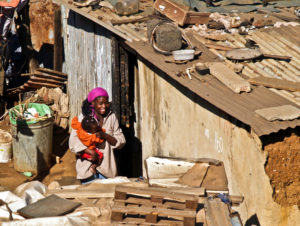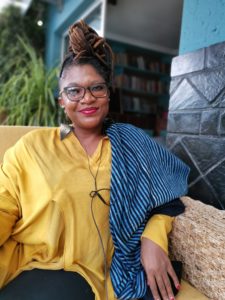It was one cold morning in June, and as listened to my youngest daughter get ready for her online class, I had no reason to believe that anything would be different from all the other days. Our street was quiet, I had just settled down with a cup of coffee to prepare for the day ahead. And suddenly there I was at 9:30 am in my living room, begging three armed men to take whatever they wanted but please spare our lives.
Nothing can prepare you for an armed robbery, and no amount of money can ever replace the most valuable thing that they take – your sense of peace and calm. Intellectually, I thought I understood inequalities and their connection to violence because I had spent years thinking about it and giving speeches as the CEO of the Southern African Trust, a nonprofit that works with poor communities across Southern Africa on a variety of issues, including poverty. But I wasn’t ready for how profoundly a personal experience can change everything. I haven’t stopped thinking about those young men. Who were they? What made them so desperate they committed a crime in broad daylight? Would they have invaded our home if it weren’t for the social and economic impacts of lockdown and COVID-19 restrictions?
The sad reality is in South Africa this incident could have happened at any time. COVID-19 simply worsened a pre-existing problem. South Africa has the highest wealth inequality rates in the world and notably high levels of violent crime linked to poverty, unemployment and disparities between the poor and the rich that have only been aggravated by the pandemic. During the COVID lockdown, the country passed 30.1% unemployment in the first quarter of 2020 against the backdrop of an all-time high number of 7.1 million unemployed people, most of whom are young. Food insecurity in South Africa is at its highest, more and more people are increasingly desperate.
Little has been done to improve the lives of the poor in South Africa since 1994 due to the government’s relentless pursuit of neo-liberal policies.
The new dispensation increasingly defines freedoms in terms of the market, resulting in the top 20 per cent of the population holding over 68 percent of income while the bottom 40 percent shares only 7%. This specifically affects black South Africans because the structural inequalities of apartheid have never been fully dismantled. Redistributive programmes such as the Reconstruction and Development Programme which provided space for new housing policy, reconstruction and development were quickly replaced by neo-liberal and pro-privatisation policies including Growth, Employment and Redistribution (GEAR). Poverty, low standards of education and poor public services still drive millions of men and women to the cities with slim job prospects for significant periods.
The police told me that the suspected robbers at my home came from a hostel in downtown Johannesburg, notorious as sources of crime and recurring xenophobic attacks. These hostels house hundreds of unemployed young men under crowded conditions. Rooms built for four people often house up to 15 people. The BBC reported that Jeppe Hostel in Johannesburg, meant to house 3200, has over 10 000 people. Some have been revamped into family units, but despite these efforts, residents enjoy very little privacy and comfort.
The logic of violence is embedded in the hostels. In apartheid-era South Africa, hostels were sites of exploitation of black labour and migrant workers. As Noor Nieftagodien writes, they were never designed with human comfort and welfare in mind, but to perpetuate conditions of temporariness even when residents lived there for most of their working lives. Black labour was merely a commodity for nearby mine owners. Not much seems to have changed. Apartheid relied on a conduit of cheap labour to urban areas to sustain its broken economic system and the survival of the hostel system suggests that the system has never truly been destroyed.

In contemporary South Africa, labour migration to urban areas continues, with Johannesburg receiving on average, 400,000 migrants every year. Add to over 1 million people already on the municipality housing waiting list and predictably most migrants end up in informal settlements and hostels. By 2014, 23 percent of the urban population in South Africa was living in informal housing with slim job prospects. Young men from rural areas and former Bantustans in search of jobs and a brighter future in the cities end up in the hostels following the footsteps of generations that came before them.
At the Southern Africa Trust, we have always believed that being poor doesn’t make people criminals. Rather inequality that keeps even the basics of food, shelter and clothing out of the reach of millions exacerbates the frustrations and desperations. Economist Thomas Piketty warns that undeterred capitalism automatically generates arbitrary and unsustainable inequalities that radically undermine the meritocratic values on which democratic societies are based. South Africa, unfortunately, has all the ingredients of a ticking time bomb. Spatial inequality in urban South Africa keeps the very poor living alongside the rich, witnessing in close range the ever-growing gap, and perceived impunity displayed by high profile individuals getting away with white-collar crime and corruption adds to the frustration.
My family and I will recover from the trauma, but this experience has renewed my belief that a capitalist system and market-driven future will not deliver public safety. South Africa must urgently revisit its commitment to equality, social reform and transformation, address spatial segregation, improve access to quality social services and expand income opportunities for those at the bottom of the economy. These hostels are a symptom and source of despair, frustration and disappointment in the current Government ignoring grievances of the past. It doesn’t matter how high we build our walls in the suburbs: none of us are safe until South Africa deals with inequality and urgently renews its commitment to social reform and redistribution.
 Masego Madzwamuse is an African Feminist, Designer and CEO of the Southern Africa Trust, which was established in 2005 to support civic engagement in ending poverty and inequality in Southern Africa. She is a 2020 Aspen New Voices Fellow.
Masego Madzwamuse is an African Feminist, Designer and CEO of the Southern Africa Trust, which was established in 2005 to support civic engagement in ending poverty and inequality in Southern Africa. She is a 2020 Aspen New Voices Fellow.
